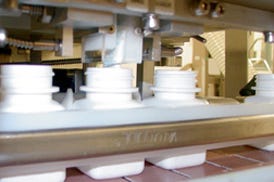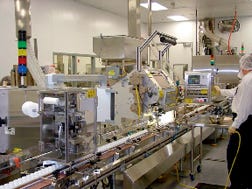Desiccant drives pharma line efficiency
January 29, 2014
Roxane Laboratories, Inc., a global leader in the development, manufacture and marketing of innovative pharmaceutical products and a subsidiary of Ridgefield, CT-based Boehringer Ingelheim Corp., was experiencing challenges with its moisture-prevention system for a number of its bottled products. Inconsistent desiccant packet lengths and punched-hole irregularities between desiccant packets caused significant downtime on its pharmaceutical packaging line.
Roxane turned to Multisorb Technologies, Inc. (www.multisorb.com) and its StripPax® sorbent packets for a solution. Used with Multisorb's APA-2000 dispensing equipment, manufactured by Active-Pak Automation (APA [www.active-pak.com]), a division of Multisorb, the new packets have almost completely eliminated downtime and have improved packaging efficiency by 20 percent.
Roxane began in 1885 as Columbus Pharmacal, a small, regional pharmaceutical manufacturer based in Columbus, OH. More than 100 years later, the company now employs approximately 910 people and manufactures more than 350 pharmaceutical products.
The key to Roxane's success is its ability to manufacture unique, high-quality products to meet consumers' needs in special markets. To support this strategy, the company manufactures unit-dose tablets, capsules and oral solutions for hospital pharmacies and home-care use.

An automatic dispensing unit is used to add the sorbent packets to bottled pharmaceuticals.
As a packaging engineer at Roxane, Julie Rink continuously keeps up to date on the most effective moisture-protection systems to ensure that Roxane maintains its reputation of providing quality pharmaceutical products. Protection against moisture is critical for pharmaceutical stability, particularly for sensitive drugs. Of the company's 350 different formulations, 45 require desiccant technology.
“Certain medications are prone to moisture-induced degradation,” says Rink. “Without proper desiccation, pharmaceutical products can stick together, react with ambient moisture inside the package or experience unwanted microbial activity—all of which result in a reduced shelf life.”
Roxane was already using a silica-gel-based desiccant packet in its packaging line, but inconsistent packet lengths and variations in the punched holes between packets used for cutting registration caused difficulty when running the packets on automatic dispensing machinery. As the company's existing APA-2000 dispensing technology operates in “fail-safe” mode, it rejects out-of-length packets, avoiding cutting them open and contaminating the line. However, frequent operator intervention to remove improperly manufactured packets from the dispenser resulted in significant downtime.
After evaluating the available solutions to Roxane's packaging challenge, a team led by Rink and manager of production maintenance Sascha Kellermann decided to make the switch to 1-g StripPaxsilica-gel packets from Multisorb. Initial conversations between Roxane and Multisorb took place in November 2004 at PACK EXPO International. By December of that year, the conversion to StripPax was complete, representing an approximate four-week turnaround time. “I was able to bring samples of the components for Multisorb to evaluate on-site,” says Kellermann. “They came back very quickly with concrete information for us.”
In combination with the APA-2000 dispenser, the switch to StripPax has increased line speeds from approximately 75 units/min to almost 95 units/min—an improvement of more than 25 percent. Downtime has also been drastically reduced, decreasing to nominal amounts. “Since we've switched, downtime has been almost completely eliminated,” says Kellermann. “The time spent on maintenance is negligible, if at all.”
The combination of increased speeds combined with the elimination of downtime has enabled an overall packaging efficiency improvement of 20 percent. “The accuracy of indexing Multisorb's StripPax allows us to run higher-quality products at faster speeds,” says Kellermann.
Adds Rink “We're planning to convert all products that require a desiccant to StripPax.”

Accurate indexing of the desiccant packets enables Roxane to run its production line at faster speeds.
StripPaxare compact, durable sorbent packets with high moisture-adsorbing capacity that take up limited space. The consistency of length and the translucent seal between desiccant packets provides for an accurate cut every time, claims Multisorb.
One StripPax sachet dropped into each bottle provides sufficient desiccation for Roxane's current bottle sizes, a dispensing technique referred to as a “single drop.” If a larger package size were to be developed, multiple drops would be considered for added moisture protection. “With a larger size, a double-drop would provide the additional barrier against moisture degradation,” says Kellermann. “The small profile of StripPax would allow us more desiccation without much adjustment to the packaging line.”
With a product line of more than 350 different formulations, keeping costs under control and ensuring reliability are vital to Roxane. Although various options for desiccation are available, the team did not consider switching to another method of moisture protection besides a sachet. “We can achieve the line speeds we need with the sachet while keeping costs down,” Kellermann explains.
More information is available: |
Multisorb Technologies, Inc., 908/849-3005. www.multisorb.com. |
Active-Pak Automation, 716/662-3475. www.active-pak.com. |
You May Also Like


